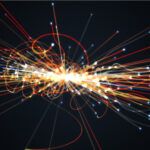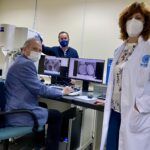The Commission has inaugurated the latest European supercomputer model together with the European High Performance Computing Joint Undertaking (EuroHPC Joint Undertaking), the Italian Ministry of Universities and Research and the CINECA consortium: LEONARDO, located at the Tecnopolo in Bologna (Italy).
LEONARDO is a world-class supercomputing system developed and assembled in Europe. When fully operational, it will have a computing capacity approaching 250 petaflops (250 000 trillion calculations per second). LEONARDO is currently ranked as the fourth most powerful supercomputer in the world. 120 million, half of which comes from the Commission and the other half from the Italian Ministry of Universities and Research and the CINECA consortium, made up of five EuroHPC participating countries (Austria, Greece, Hungary, Slovakia and Slovenia).
LEONARDO is the second of Europe’s pre-exascale supercomputers to be commissioned, after LUMI in Kajaani, Finland. It combines state-of-the-art high-performance computing components with the use of artificial intelligence to carry out tasks of enormous complexity. This will enable it to conduct unprecedented research into cancer and the search for new drugs, understand how the human brain works, discover clean energy technologies, develop more accurate climate models and contribute to the prediction and monitoring of natural disasters and pandemics.
The LEONARDO supercomputer system focuses on environmental sustainability and is equipped with tools that enable dynamic adjustment of energy consumption, thus ensuring an intelligent and optimal balance between energy savings and performance. In addition, it uses a water cooling system to increase energy efficiency.
The computing services provided by CINECA with LEONARDO will be further enhanced by the integration of a quantum computer, as CINECA has also been selected as the host entity for one of the first quantum computers built in Europe.

Policy Programme “Path to the Digital Decade”: The Council and the European Parliament reach a provisional agreement
|
Next steps
The development of Europe’s world-class high-performance computing and data infrastructure continues with the ongoing installation of the Deucalion peta-scale supercomputer in Portugal and the third European pre-exascale supercomputer, MareNostrum 5, in Spain.
In addition, the EuroHPC Joint Undertaking already announced in June 2022 the new sites for supercomputers, one of which will be the first European exascale supercomputer: JUPITER, which will be housed at the Jülich Supercomputing Center in Germany.
In October 2022, the EuroHPC Joint Undertaking also notified the six centers that will house quantum computers that will be integrated with existing supercomputers.
Moreover, a call for a second European exascale supercomputer is planned for 2023, as well as the distribution of additional supercomputers and quantum computers in 2023 and beyond.
Context
CINECA is a non-profit consortium composed of 70 Italian universities, 40 national institutions and the Italian Ministries of Universities and Research and of Education. The five countries participating in the EuroHPC Joint Undertaking are: Greece, Hungary, Austria, Slovenia and Slovakia.
LEONARDO now joins the existing supercomputers of the EuroHPC Joint Undertaking: Discoverer in Bulgaria, MeluXina in Luxembourg, Vega in Slovenia, Karolina in the Czech Republic and LUMI in Finland.
The European High Performance Computing Joint Undertaking (EuroHPC Joint Undertaking) is a legal and funding entity created in 2018 to enable the EU and EuroHPC participating countries to coordinate their efforts and pool their resources with the aim of making Europe a world leader in supercomputing. In July 2021, the Council adopted the EuroHPC Regulation, which provided additional investment of EUR 7 billion.







Leave a Reply